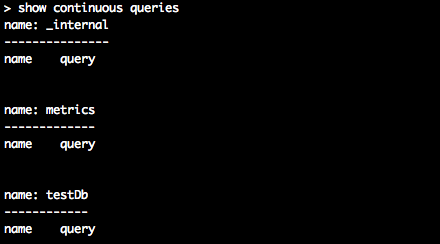influxdb是目前比较流行的时间序列数据库
何谓时间序列数据库?
什么是时间序列数据库,最简单的定义就是数据格式里包含Timestamp字段的数据,比如某一时间环境的温度,CPU的使用率等。但是,有什么数据不包含Timestamp呢?几乎所有的数据其实都可以打上一个Timestamp字段。时间序列数据的更重要的一个属性是如何去查询它,包括数据的过滤,计算等等。
nfluxdb是一个开源的分布式时序、时间和指标数据库,使用go语言编写,无需外部依赖。
它有三大特性:
时序性(Time Series):与时间相关的函数的灵活使用(诸如最大、最小、求和等);
度量(Metrics):对实时大量数据进行计算;
事件(Event):支持任意的事件数据,换句话说,任意事件的数据我们都可以做操作。
同时,它有以下几大特点:
schemaless(无结构),可以是任意数量的列;
min, max, sum, count, mean, median 一系列函数,方便统计;
Native HTTP API, 内置http支持,使用http读写;
Powerful Query Language 类似sql;
Built-in Explorer 自带管理工具。
注意:InfluxDB使用主机的本地UTC时间来分配时间戳,并用于协调。InfluxDB使用NTP协议来同步不同主机之间的时间,如果不同主机的时钟没有同步,那么写入数据库中的数据的时间戳有可能是不准确的。
下面是简易安装教程,安装也比较简单
wget https://repos.influxdata.com/centos/6/x86_64/stable/influxdb-1.7.1.x86_64.rpm yum localinstall influxdb-1.7.1.x86_64.rpm
配置文件相关
#查看配置命令 influxd config #配置文件位置 /etc/influxdb/influxdb.conf
启动influxdb
/etc/init.d/influxdb start
添加开机启动
chkconfig influxdb on
注:influxdb1.1以后版本已经去掉web管理页面相关配置,所以并没有web管理页面
Chronograf安装也是特别简单
wget https://dl.influxdata.com/chronograf/releases/chronograf-1.7.3.x86_64.rpm sudo yum localinstall chronograf-1.7.3.x86_64.rpm /etc/init.d/chronograf start #启动 chkconfig chronograf on #开机启动
最后访问http://localhost:8888/即可,默认账户密码都是admin
influxdb基本操作
登录数据库直接执行
influx #提示以下信息就说明登录成功 Connected to http://localhost:8086 version 1.7.1 InfluxDB shell version: 1.7.1 Enter an InfluxQL query >
数据库与表的操作
#创建数据库 create database "db_name" #显示所有的数据库 show databases #删除数据库 drop database "db_name" #使用数据库 use db_name #显示该数据库中所有的表 show measurements #创建表,直接在插入数据的时候指定表名 insert test,host=127.0.0.1,monitor_name=test count=1 #删除表 drop measurement "measurement_name"
增
向数据库中插入数据。
通过命令行
use testDb insert test,host=127.0.0.1,monitor_name=test count=1
读者看到这里可能会观察到插入的数据的格式貌似比较奇怪,这是因为influxDB存储数据采用的是Line Protocol格式。那么何谓Line Protoco格式?
Line Protocol格式:写入数据库的Point的固定格式。
在上面的两种插入数据的方法中都有这样的一部分:
test,host=127.0.0.1,monitor_name=test count=1
其中:
test:表名; host=127.0.0.1,monitor_name=test:tag; count=1:field
想对此格式有详细的了解参见官方文档
查
查询数据库中的数据。
通过命令行
select * from test order by time desc
influxDB是支持类sql语句的,具体的查询语法都差不多,这里就不再做详细的赘述了。
数据保存策略(Retention Policies)
influxDB是没有提供直接删除数据记录的方法,但是提供数据保存策略,主要用于指定数据保留时间,超过指定时间,就删除这部分数据。
查看当前数据库Retention Policies
show retention policies on "db_name"

retention_policies
创建新的Retention Policies
create retention policy "rp_name" on "db_name" duration 3w replication 1 default rp_name:策略名; db_name:具体的数据库名;
3w:保存3周,3周之前的数据将被删除,influxdb具有各种事件参数,比如:h(小时),d(天),w(星期);
replication 1:副本个数,一般为1就可以了; default:设置为默认策略
修改Retention Policies
alter retention policy "rp_name" on "db_name" duration 30d default
删除Retention Policies
drop retention policy "rp_name"
连续查询(Continous Queries)
当数据超过保存策略里指定的时间之后就会被删除,但是这时候可能并不想数据被完全删掉,怎么办?
influxdb提供了联系查询,可以做数据统计采样。
查看数据库的Continous Queries
show continuous queries

continuous_queries.
创建新的Continous Queries
create continous query cq_name on db_name begin select sum(count) into new_table_name from table_name group by time(30m) end cq_name:连续查询名字; db_name:数据库名字; sum(count):计算总和; table_name:当前表名; new_table_name:存新的数据的表名; 30m:时间间隔为30分钟
删除Continous Queries
drop continous query cp_name on db_name
用户管理
#显示用户 show users #创建用户 create user "username" with password 'password' #创建管理员权限用户create user "username" with password 'password' with all privileges #删除用户 drop user "username"
